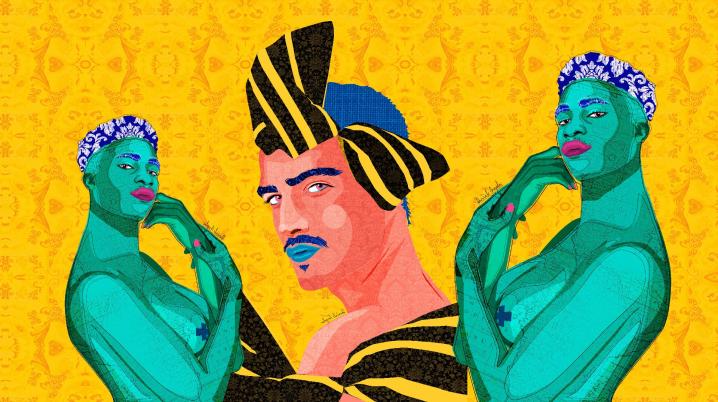This programme is in cooperation with the International Queer & Migrant Film Festival.
The Visitors Programme focuses on creating a greater social cohesion and more open society that has more room for cultural differences. The countries selected are: Marocco, Russia, Turkey and Egypt. The themes of this programme are film, festival and visual arts in Morocco, Egypt and Russia.
Four experts on film and visual arts will visit the Netherlands in the frame of the Visitor’s Programme to find partners for future collaborations and to share their knowledge during the International Queer Migrant Film Festival (IQMF).
During their visit, the visitors will take part in the IQMF Academy and engage in different public talks at the Festival. They will also get a tailor-made program to strengthen their network and to exchange their knowledge with experts. the objectives of this program are to work towards a more inclusive society and cultural sector.
Visitors
Masha Godovannaya is a visual artist, experimental filmmaker and queer-feminist researcher, born in Moscow, Russia. Approaching art production as artistic research and collective action, Masha’s artistic practice draws on combinations of approaches and spheres such as moving image theory, experimental cinema and DIY video tradition, social science, queer theory, decolonial methodologies, and contemporary art.
Sido Lansari
Mohammad Shawky Hassan is a filmmaker living and working between Cairo and Berlin. He
studied philosophy, film directing and cinema studies at the American University in Cairo, The Academy of
Cinematic Arts & Sciences and Columbia University. His films include 'It Was Related to M'e (2011), 'On a
Day like Today' (2012), 'Compos Mentis' (2016) and 'And on a Different Note' (2015), which premiered at the
Berlinale Forum Expanded, and was acquired by the Museum of Modern Art (MoMA) in New York as part of
its permanent collection. He is currently working on his feature-length audiovisual essay 'Shall I Compare
You to a Summer’s Day', where romantic encounters, haunting memories, pop music and folktales all
intersect in a genre-bending project that explores the ways in which a queer lover’s discourse could emerge
from traditional modes of storytelling and various registers of language deeply rooted in Arab popular culture.
Abdellah Taïa was born in Rabat in 1973. He has published several French-language novels with Éditions du Seuil, translated into many languages in Europe and USA, including “L’Armée du Salut” (2006), “Une mélancolie arabe” (2008), “Le Jour du Roi” (Prix de Flore, 2010), “Infidèles” (2012), “Un pays pour mourir” (2015), “Celui qui est digne d’être aimé” (2017) and “La vie lente” (2019). In 2014, he directed his first film, “L’Armée du Salut”, based on his eponymous novel.
Public talks
The visitors will actively engage in two talks at the Festival. All talks are € 5 and free for people that already have a ticket to any screening of IQMF. More information on the tickets on iqmf.nl
Festivals for Freedom (December 7 at 4.30pm)
On the 7th of December Masha Godovannaya and Sido Lansari will take place in a panel discussion on Festivals for Freedom. Queer film festivals are cultural events, yet they still maintain a certain activistic tone, trying to make LGBTQ+ cinema accessible to wider audiences. Being different is sometimes accepted, but sometimes strongly rejected. How to work with the unpleasant legislation of your homeland, the lack of funding and the hostile public opinion? Several festival representatives will explain how safe spaces for the local communities have been created despite all obstacles.
Queer Artivism (December 7 at 8pm)
After the screening of their films on the 7th of December, filmmakers Abdellah Taïa and Sido Lansari will join a panel talk on the role of art in relation to activism. The panel will furthermore consist of queer activists of Moroccan descent living in the Netherlands. They will reflect on topics related to discrimination and marginalization as a minority in Dutch society.
Moderated by Myriam Sahraoui (Morocco Advisor at DutchCulture).
![]()
Safe art spaces: The Balkan Approach (December 8 at 3pm)
This panel talk will shed a light on the achievements of the launches of safe art spaces for LGBTI youth in the Western Balkan region. Multiple LGBT+ activists from Albania, Kosovo, North-Macedonia and Serbia will present the results. The project resulted in Queer Film Days in four countries, how were these events perceived by society?
Moderated by Chris Belloni (founder of the IQMF festival).
Guests: Cees de Graaff (director of DutchCulture) Arber Kodra (Open Mind Spectrum Albania), Ljobomir Faizov (Helsinki Comittee for Human Rights Macedonia) and more guests to be announced.



